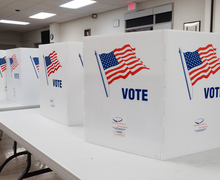Lansat: Post-Orlando, LGBT safe spaces deserve respect
Rachel Gilbert | Feature Editor
Attendees of CNY Pride's Syracuse vigil lit candles last Monday for the victims of the Orlando shooting.
Sunday will mark the first anniversary of the Supreme Court’s legalization of same-sex marriage, but equality for America’s LGBT community is still on the horizon.
A man decided to kill 49 people and wound 53 others in a gay nightclub in Orlando, Florida last Sunday. And apart from his actions resulting in the biggest mass shooting in modern U.S. history, the incident has rattled the LGBT community and its allies.
A little closer to home, there had been a debate over a 40-foot buffer zone regarding protesters at this past Saturday’s Central New York Pride Fest. But never mind that District Judge Lawrence Kahn recently ruled in favor of self-proclaimed evangelist Jim Deferio on the grounds of free speech and allowed him to continue preaching homophobia to the people of Syracuse. After the Orlando shooting, it’s clear that allies of the LGBT community should take all of the appropriate steps to protect it from any potential harm by creating and preserving safe spaces — especially in this time of mourning.
As it applies to Syracuse University students, faculty and staff returning in the fall, whether or not they’re a member of the LGBT community, they should remember that acceptance beyond just tolerance is key. This involves standing up to hatred by calling out homophobia on campus, making sure peers and colleagues feel comfortable embracing their sexuality and fighting back against the violence with humanity and compassion. The SU community should be compelled to make campus an accepting environment for people of all backgrounds — SU itself should be a safe space for the LGBT community.
It’s true that the phrase “safe space” has a reputation as a politically correct buzzword, but any form of hate toward the LGBT community should be taken seriously after the Orlando shooting. No one can know if someone is masking physical violence with verbal hatred. In light of the shooting, the LGBT community and its allies can no longer take those risks.
At best, safe spaces are a crucial stepping stone to fighting hatred that stems from differences in opinion and identity. Gay bars in particular have historically served as safe havens for LGBT individuals, and having this space violated by the violence of the Pulse shooting has traumatized the community.
Robin Riley, director of SU’s LGBT studies program and an assistant women’s and gender studies professor at SU, understands the importance of the sanctuary that gay bars have provided to the LGBT community.
“Given the history of LGBT folks having to live undercover, gay and lesbian bars and clubs served an important role for LGBT folks where they were free to meet other LGBT people (and) show affection in public and dorm communities,” Riley said in an email.
Since the attacks, New York state has come together in support of Orlando: among tributes such as the one where Gov. Andrew Cuomo addressed a crowd at Stonewall Inn, CNY Pride held a vigil in Syracuse. And likewise, since the attack, social media was buzzing with encouraging posts for the Orlando shooting victims and survivors.
But it is not enough to repost an image, write a novel as a status or change your profile picture. Just using social media to express your condolences for the victims does not fix the problem. Americans must go out and try to change the country’s homophobic climate. And that starts with respecting the safe spaces of the LGBT community.
SU’s own LGBT Resource Center is open to all students, faculty and staff and can serve as a tangible starting point for making that difference on campus. Not only does the center provide comfort for LGBT individuals, but it also educates SU on LGBT culture by hosting social events and development training, including the “Safer People, Safer Spaces” sessions geared toward allies.
Riley also advises SU students to learn about the LGBT politics that instill fear in the community and lead to tragedies like Orlando. From an academic standpoint, SU offers multiple queer sexuality courses that help put LGBT history and culture in context.
“This is an event and an issue that should be of concern to all of us, not only LGBT people,” Riley said. Even if it’s as simple as telling your dorm-mate not to use “gay” as insult, Riley hopes that students will get more involved on campus and interrupt homophobia whenever they encounter it.
As individuals, members of the LGBT community and their allies often forget that that one person can make a change. And while there is no one simple answer for fighting the injustice that LGBT individuals face, you can still make a difference. You do have a voice.
The only remedy for hatred is love.
Myelle Lansat is a junior magazine journalism major and policy studies minor. Her column appears biweekly. She can be reached at malansat@syr.edu.
Published on June 22, 2016 at 7:10 pm






